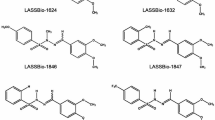Abstract:
Objective: In the guinea-pig isolated perfused lung, co-administration of bradykinin (BK) and histamine causes the release of pro-inflammatory neuropeptides, an effect that is largely dependent on BK-induced formation of prostaglandins. Since it is known that at least two isoenzymes, cyclooxygenase-1 (COX-1) and cyclooxygenase-2 (COX-2) catalyse the conversion of arachidonic acid to prostaglandins (PGs) and thromboxanes, the present study aimed at investigating the effect of selective COX-1 and COX-2 inhibitors on the evoked release of substance P (SP).¶Material and methods: Lungs were vascularly perfused with oxygenated physiological salt solution containing peptidase inhibitors. BK (0.1 μM) and histamine (100 μM) were added to the perfusate for 10 min and 5 min, respectively. The concentrations of 6-keto-PGF1α, cysteinyl-leukotriene (LT), and SP were determined in the outflow by radioimmunoassay.¶Results: In non-stimulated preparations, indomethacin (2 μM) and the selective COX-1 inhibitor SC-560 (0.03-1 μM) reduced basal release of 6-keto-PGF1α, without significantly affecting the release of cysteinyl-LT and SP. The selective COX-2 inhibitors NS-398 (1 μM) or DFU (10 μM) had no significant effect on the basal release of eicosanoids or SP. Co-administration of BK and histamine caused a pronounced increase in the concentration of 6-keto-PGF1α and cysteinyl-LT, and SP in the effluate. Under these conditions, indo-methacin as well as SC-560 reduced the release of 6-keto-PGF1α, enhanced cysteinyl-LT release, and attenuated the release of SP. In contrast, the selective COX-2 inhibitors NS 398 and DFU had no significant effect on the stimulated release of eicosanoids or SP.¶Conclusions: These results suggest that in the isolated guinea-pig lung, basal prostanoid biosynthesis as well as BK-induced stimulation of prostanoid formation and subsequent facilitation of histamine-induced SP release is primarily mediated by COX-1 without detectable involvement of COX-2.¶
Similar content being viewed by others
Author information
Authors and Affiliations
Additional information
Received 25 May 2000; returned for revision 25 July 2000; accepted by M.J. Parnham 25 September 2000
Rights and permissions
About this article
Cite this article
Amann, R., Schuligoi, R. & Peskar, B. Effects of COX-1 and COX-2 inhibitors on eicosanoid biosynthesis and the release of substance P from the guinea-pig isolated perfused lung. Inflamm. res. 50, 50–53 (2001). https://doi.org/10.1007/s000110050724
Issue Date:
DOI: https://doi.org/10.1007/s000110050724




